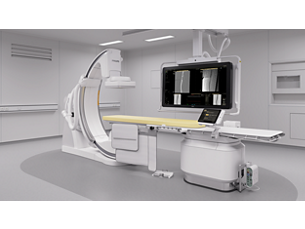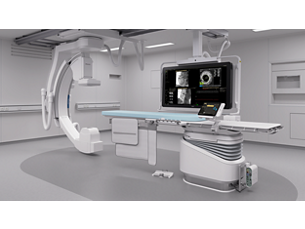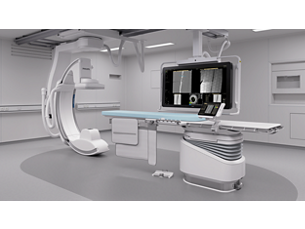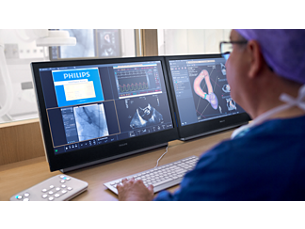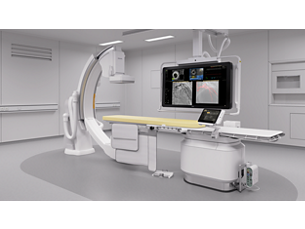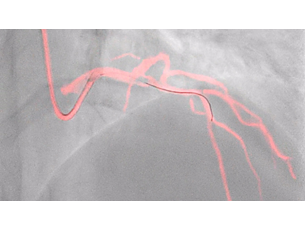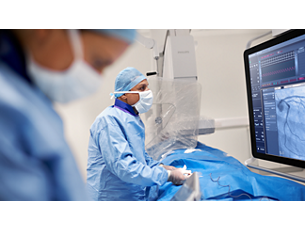- Insightful dual-axis rotation
-
Insightful dual-axis rotation
Conventional coronary angiography and single-axis rotational angiography (RA) have limitations when diagnosing coronary artery disease due to vessel overlap and foreshortening. Unlike these techniques which acquire multiple acquisitions, CardiacSwing can perform LAO/RAO and cranial/caudal movements in a single acquisition to enhance visibility and patient care. - New views of complex vessels
-
New views of complex vessels
Unexpected angles are visualized thanks to the LAO/RAO and cranial/caudal trajectory of CardiacSwing. These views of the coronary tree provide additional support for lesion assessment and can expose views of vasculature that might be hidden in conventional coronary angiography or single-axis RA. CardiacSwing may help reduce misinterpretation caused by vessel eccentricity, overlap, and foreshortening. - One run saves valuable time
-
One run saves valuable time
CardiacSwing has the potential to reduce procedure time significantly by replacing the multiple acquisitions required by standard angiography or single-axis rotational angiography with a single run.[1-2] In addition, it can enhance the consistency of imaging results by eliminating the gap between adjacent projections and potential deviation from the optimal angle of observation.[3]
Insightful dual-axis rotation
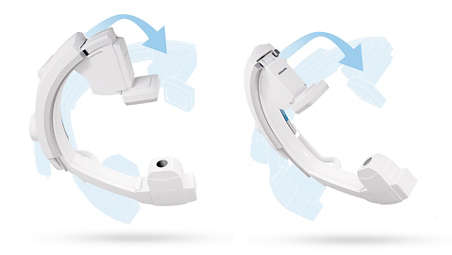
Insightful dual-axis rotation

Insightful dual-axis rotation
New views of complex vessels
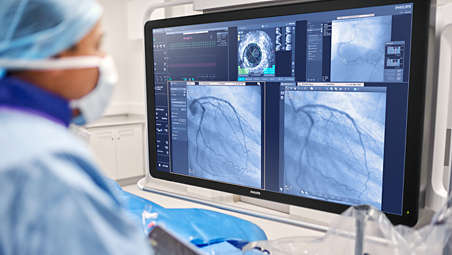
New views of complex vessels

New views of complex vessels
One run saves valuable time
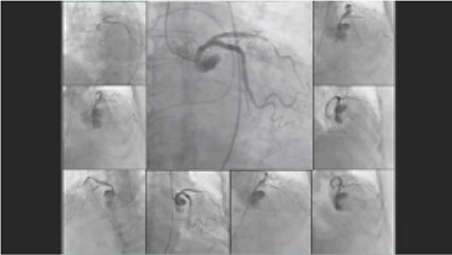
One run saves valuable time

One run saves valuable time
- Insightful dual-axis rotation
- New views of complex vessels
- One run saves valuable time
- Insightful dual-axis rotation
-
Insightful dual-axis rotation
Conventional coronary angiography and single-axis rotational angiography (RA) have limitations when diagnosing coronary artery disease due to vessel overlap and foreshortening. Unlike these techniques which acquire multiple acquisitions, CardiacSwing can perform LAO/RAO and cranial/caudal movements in a single acquisition to enhance visibility and patient care. - New views of complex vessels
-
New views of complex vessels
Unexpected angles are visualized thanks to the LAO/RAO and cranial/caudal trajectory of CardiacSwing. These views of the coronary tree provide additional support for lesion assessment and can expose views of vasculature that might be hidden in conventional coronary angiography or single-axis RA. CardiacSwing may help reduce misinterpretation caused by vessel eccentricity, overlap, and foreshortening. - One run saves valuable time
-
One run saves valuable time
CardiacSwing has the potential to reduce procedure time significantly by replacing the multiple acquisitions required by standard angiography or single-axis rotational angiography with a single run.[1-2] In addition, it can enhance the consistency of imaging results by eliminating the gap between adjacent projections and potential deviation from the optimal angle of observation.[3]
Insightful dual-axis rotation

Insightful dual-axis rotation

Insightful dual-axis rotation
New views of complex vessels

New views of complex vessels

New views of complex vessels
One run saves valuable time

One run saves valuable time

One run saves valuable time
Related products
Alternative products
-
Azurion 3 M15
- Image Guided Therapy System Monoplane Floor Mounted with a 15" flat detector
- Covers a wide range of cardiac and vascular procedures and offers flexibility for multi-purpose use
- Parallel working enables you to get more done, leading to high throughput and fast exam turnover
- Insightful Live Image Guidance helps clinicians determine the most beneficial course of treatment
Ürünü görüntüle
-
Azurion 7 M12
- Image Guided Therapy System Monoplane Ceiling/Floor Mounted with a 12" flat detector
- Provides hi-res imaging over a large field of view, making it ideal for cardiac interventions
- Includes the ClarityIQ imaging technology for excellent visibility at ultra low X-ray dose levels
- Control all relevant applications via the central touch screen module at table side
Ürünü görüntüle
-
Azurion 7 M20
- Image Guided Therapy System Monoplane Ceiling/Floor Mounted with a 20" flat detector
- Enhance visibility for diverse vascular, oncology and cardiac procedures with great image quality
- Control all relevant applications via the central touch screen module at table side
Ürünü görüntüle
-
FlexSpot
- All relevant applications on one workspot for an efficient, clutter-free control room
- Includes one or two widescreen monitors, a mouse and a keyboard for full control
- Team members can perform all relevant tasks at a flexible workspot, without interrupting each other
- Create an unlimited number of screen layouts for every procedure and/or clinical user
Ürünü görüntüle
-
Azurion 3 M12
- Image Guided Therapy System Monoplane Floor Mounted with a 12" flat detector
- Provides high-resolution imaging over a large Field of View (FOV)
- Visualize the aortic valve and part of the aortic arch or the entire coronary tree in a single view
- Allows team members to work in the control and exam room without interrupting each other
Ürünü görüntüle
-
Dynamic Coronary Roadmap
- Real-time, automatic, motion compensated coronary imaging for guidance
- Navigate coronary arteries efficiently and with confidence
- Seamless integration into standard of care workflow and in daily clinical practice
Ürünü görüntüle
-
StentBoost
- Simple, quick, and cost-effective tool to enhance stent visualization in the coronary arteries
- With StentBoost Subtract, you can see the stent in relation to the vessel wall as you are working
- Potential problems such as imperfect positioning or under-deployment can be corrected immediately
- StentBoost Vascular enhances stents in larger vasculature
Ürünü görüntüle
-
Azurion 3 M15
Elevate your vascular capabilities with the Azurion 3 with 15'' flat detector. Your interventional teams benefit from superb consistency and efficiency as they perform diverse neuro, endovascular, oncology and cardiac procedures. Take the next step in improving care and managing costs. Seamlessly control all relevant applications from a single touch screen at table side, to help make fast, informed decisions in the sterile field.
Ürünü görüntüle
-
Azurion 7 M12
Experience outstanding interventional cardiac and vascular performance on the Azurion 7 Series with 12'' flat detector. This industry leading image-guided therapy solution supports you in delivering outstanding patient care and increasing your operational efficiency by uniting clinical excellence with workflow innovation. Seamlessly control all relevant applications from a single touch screen at table side, to help make fast, informed decisions in the sterile field.
Ürünü görüntüle
-
Azurion 7 M20
Experience outstanding interventional cardiac and vascular performance on the Azurion 7 Series with 20'' flat detector. This industry leading image-guided therapy solution supports you in delivering outstanding patient care and increasing your operational efficiency by uniting clinical excellence with workflow innovation. Seamlessly control all relevant applications from a single touch screen at table side, to help make fast, informed decisions in the sterile field.
Ürünü görüntüle
See all related products -
FlexSpot
As more applications come into your lab, it's more important than ever to work as efficiently as possible. FlexSpot gives you seamless access to all applications at one compact, customizable workplace to significantly reduce clutter and simplify workflow. Team members can perform different tasks separately, without interrupting each other, to reduce gaps between cases.
Ürünü görüntüle
-
Azurion 3 M12
Elevate your interventional cardiology capabilities with the Azurion 3 with 12'' flat detector. This high performance Image Guided Therapy System allows interventional teams to perform routine and challenging cardiac interventions. Seamlessly control all relevant applications from a single touch screen module at table side for a consistent user experience, and excellent lab performance and patient care.
Ürünü görüntüle
-
Dynamic Coronary Roadmap
Dynamic Coronary Roadmap, a Philips-exclusive technology, creates a motion-compensated, real-time view of coronary arteries. Recent evidence demonstrates that DCR can reduce contrast agent by 28.8% during a PCI procedure. With DCR a highlighted coronary angiogram is superimposed on a live 2D fluoroscopic image, creating a colored roadmap that adjusts automatically, providing continuous visual feedback on positioning of wires and catheters.
Ürünü görüntüle
-
StentBoost
StentBoost is a simple, quick, and cost-effective tool to enhance stent visualization in the coronary arteries. With the StentBoost Subtract feature, you can see the stent in relation to the vessel wall as you are working.
Ürünü görüntüle
- 1. Giuberti RSO, Caixeta A, Carvalho AC, Soares MM, Abreu-Silva EO, Medina Pestana JO, Silva Junior, HT, Lucia Vaz M, Genereuw P, Fernandes RWA. A randomized trial comparing dual axis rotational versus conventional coronary angiography in a population with a high prevalence of coronary artery disease. J Interv Cardiol. 2014 Oct;27(5):456-64. Doi: 10.1111/joic.12148. Epub 2014 Aug 18.
- 2. Grech M, Debono J, Xuereb RG, et al. A comparison between dual axis rotational coronary angiography and conventional coronary angiography. Catheter Cardiovasc Interv 2012;80(4): 576–580. Available from: http://www.ncbi.nlm.nih.gov/pubmed/ 22105940
- 3. Klein AJ, Garcia JA, Hudson PA, Kim MS, Messenger JC, Casserly IP, Wink O, Hattler B, Tsai TT, Chen SYJ, Hansgen A, Carroll JD. Safety and efficacy of dual-axis rotational coronary angiography vs. standard coronary angiography. Cath Cardiovas Interv. 2011;77:820-827.
